Sanatan Articles
Satyaagrah
Written on
Satyaagrah
Written on
Satyaagrah
Written on
Satyaagrah
Written on
Satyaagrah
Written on
JOIN SATYAAGRAH SOCIAL MEDIA
Nehru vs. Patel: The modern Indian history rivalry you need to know about

Jawaharlal Nehru, India’s first prime minister and Sardar Vallabhbhai Patel, its first deputy prime minister were two towering figures of India’s anti-colonial freedom movement. Both were Mahatma Gandhi’s closest associates and wielded enormous influence within the Congress Party. But their worldviews differed widely, which reflected in their contrasting attempts to shape the trajectory of the freedom movement, the Indian constitution, issues related to integration of the reluctant princely states, and matters relating to combating communal violence.
Jawaharlal Nehru and Sardar Patel
Nehru admitted in a candid letter to Gandhi towards the end of the latter’s life that it was ‘true that there are not only temperamental differences between Sardar and me but also a difference in approach in regard to economic and communal matters. These differences have persisted for a large number of years, ever since we worked together in the Congress.’ The intensity of Nehru and Patel’s conflicting opinions were often matters of grave public speculation and embarrassment for the government. To undo the fallout of an apparent divide within the cabinet, both often had to resort to public airing of statements to the effect that they had abiding love and respect for each other.
Sardar Patel Accepts Differences on Crucial Issues
“I have carefully read Jawaharlal's note sent to you, a copy of which was sent to me.
There is no disagreement on the existence of temperamental differences and different outlook on economic matters and those affecting Hindu-Muslim relations. Both of us, however, place the interests of the country above these personal differences and, aided by mutual regard, respect and love for each other, have co-operated in a common endeavour. Through our joint efforts we have weathered many a storm that beset us and despite such differences we have got over one of the most critical phases in the history of any country or any government. It is painful and rather tragic to reflect that we cannot carry this any further...”
These tensions reached an acrimonious climax when Puroshottam Das Tandon supported by Patel defeated ‘Acharya’ J B Kriplani who had Nehru’s backing for the post of Congress President in 1950. The incident cannot be viewed in isolation and refutes the idea that no fundamental differences existed between the two men. Nehru’s revulsion of Tandon interestingly stemmed from his alleged “communal and revivalist outlook” while Patel found him to be only a ‘little pro-Hindu’. There were also several other incidents in which Nehru and Patel threatened to quit their posts due to their sense of consternation in not being able to have their own way.
Patel also was subjected to unwarranted harassment by some of the Nehru’s female admirers. In his letter to Gandhi dated 7th January 1947, an emotional Patel expressed dismay at Mridula Sarabhai who ‘ha(d) made it her pastime to heap abuses upon (him)’. Patel alleged that she ‘(was) indulging in a nauseating propaganda that (Patel) want(ed) to get rid of Jawaharlal and also found a new Party’.
Similarly, Padmaja Naidu hurled petty accusations at Patel. For instance, she complained to Nehru about the allegedly high expenses incurred on a reception for Patel in Hyderabad. She also advocated that the Razakars, including those facing charges of complicity in various atrocities against Hindus, such as Mir Asghar Ali and Baquer Hussain Qureshi (they were accused of murdering several Hindus) be pardoned. Patel found ‘no justification for her hysteria’ and sternly objected to her ill advised attempts to ‘interfere with the course of justice’. Moreover, he said the government had been pretty lenient in dealing with the Razakars since only ‘one sixth of those originally involved were facing trial’.
Manibehn, Patel’s daughter had also suspected Mridula Sarabhai and Padmaja Naidu conniving with Rafi Ahmed Kidwai to undermine her father’s position which adversely affected his health. Whether such incidents had Nehru’s tacit consent is not known, although it is unlikely that he reprimanded his admirers for their misconduct.
It is true that despite their immense differences, both Nehru and Patel found a working relationship which endured till Patel’s death. But it was rendered possible in large measure by Patel’s deep sense of loyalty towards Gandhi, the Congress and the country. It is another matter that Gandhi promoted Nehru over Patel despite the latter enjoying the overwhelming confidence of the Congress Working Committee; an act which required truncation of inner party democracy. Nevertheless, Patel did not challenge Gandhi’s wisdom. Sarvepalli Gopal, Nehru’s rather sympathetic biographer, who was otherwise quite critical of Patel, conceded that Patel’s ‘stoic decency’ was a major factor which prevented a permanent schism between the two. Therefore, the fact that they had a decent working relationship and Patel’s acceptance of Nehru’s leadership does little to paper over the cracks.
After Patel’s demise, Nehru became the undisputed leader of the Congress party and ruled with an iron fist. The last semblance of internal democracy within the Congress had truly died with Patel.
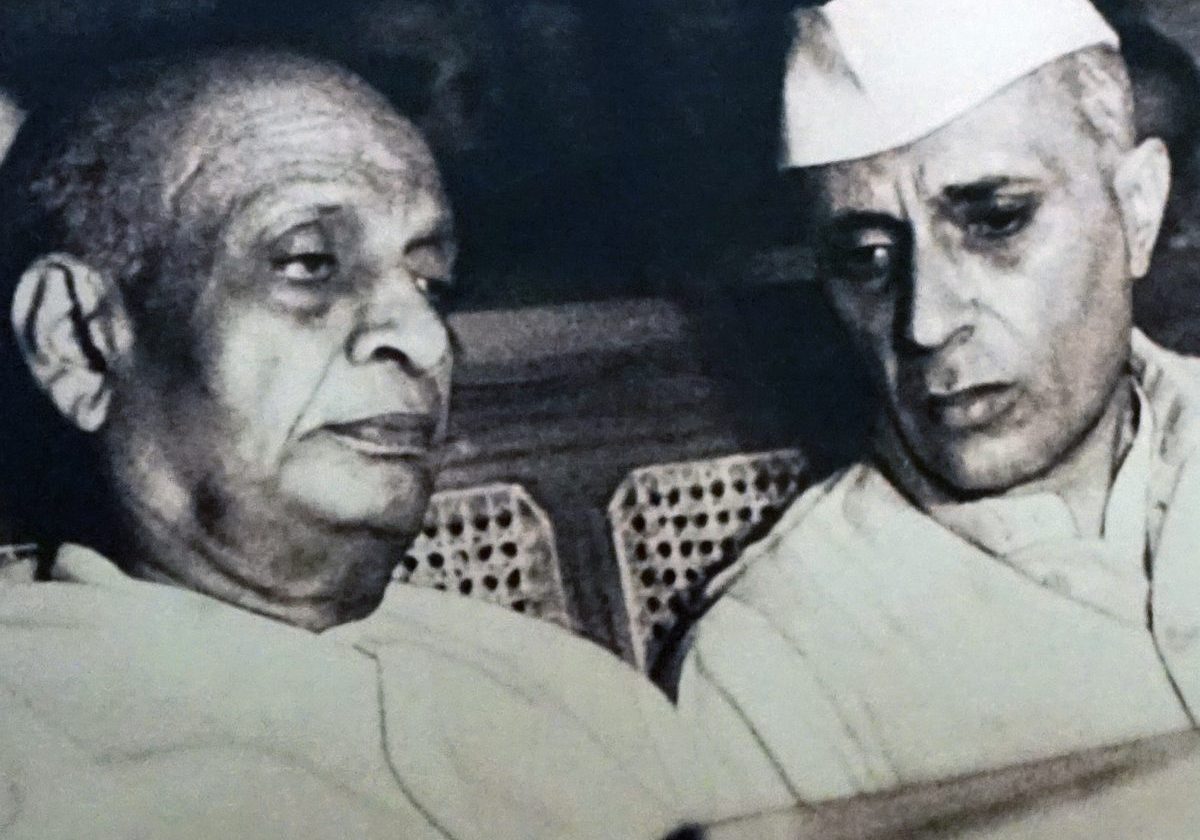 |
The Enduring Relevance
Understanding the nature of differences between both the men is critical since these differences and their unsatisfactory resolution had lasting consequences in the making of post independent India. Unfortunately, this has received very little scrutiny.
The Nehru’s worldview can be understood through his voluminous writings on India and the world. Patel, on the other hand, was not even inclined to write an autobiography. The best source of understanding Patel remains his official correspondence and epistles which were released thanks to his daughter Manibehn. The Patel commemorative volumes include some of his public speeches which provide further insight into his personality. Contemporary memoirs like those by Balraj Krishna and V Shankar, Patel’s personal assistant provide another layer of historical evidence. One, rather overlooked historical source is the diaries of Manibehn who also served as his secretary and was privy to much of Patel’s inner world.
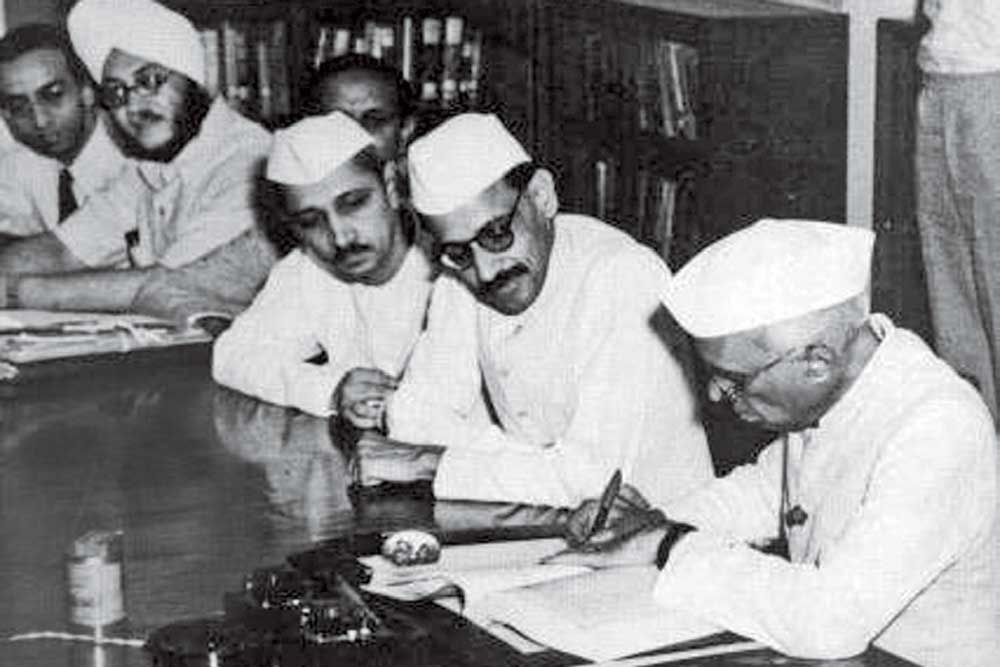 Jawaharlal Nehru signing the report of the Planning Commission on the First Five Year Plan, New Delhi, 7 July 1951 |
Differences in Economic Policy
Nehru and Patel’s economic views differed drastically. Nehru envisioned a socialist India with the ‘elimination of profit in society…With social service and cooperation taking place of competition’.
Nehru uncritically accepted socialism. It is strange that while Nehru’s books approvingly talk of Marxism and socialism, there is no comparative analysis by him of much more proven competing economic thoughts. It was as if Adam Smith, Alfred Marshall, JS Mill, John Maynard Keynes and others did not exist for Nehru. Nor did he care to read Milton Friedman (1912–2006) or Friedrich Hayek (1899–1992).
Nehru replicated the Soviet planning commission and its Five Year Plans while severely restricting the scope of private enterprise. In the 1955 Avadi session of the Congress, Nehru pushed through a resolution for creating an economy on ‘a socialist pattern’. He stopped short of forceful redistribution because he felt there was just too little money, and perhaps tempered by the relative failure of the land reform and Bhoodan movements.
Patel on the other hand believed that capitalism could be ‘purged of its hideousness’. A native Gujarati raised under the influence of the Swaminarayan Hindu sect, he did not view the spirit of enterprise with disdain. For him, creation of wealth for ushering in societal prosperity was a desirable trait. He was unfairly charged of being in cahoots with capitalists such as GD Birla, to which he responded by stating that he enjoyed no personal property and that he considered friendship towards all irrespective of their creed or class his duty.
He also emphatically denied the inevitability of class struggle which was an article of faith for the Marxists. It was Patel who was instrumental in purging Nehru’s call for socialism from official Congress resolutions. In his minute ‘regarding the economic situation of the country’, Patel affirmed his faith in the capitalists, industrialists and economists who ‘when approached in the right manner’ offered promising prospects for both production and just remuneration for labour. Had Patel lived longer, it is doubtful if Nehru could have thrust his socialist agenda on the Indian economy.
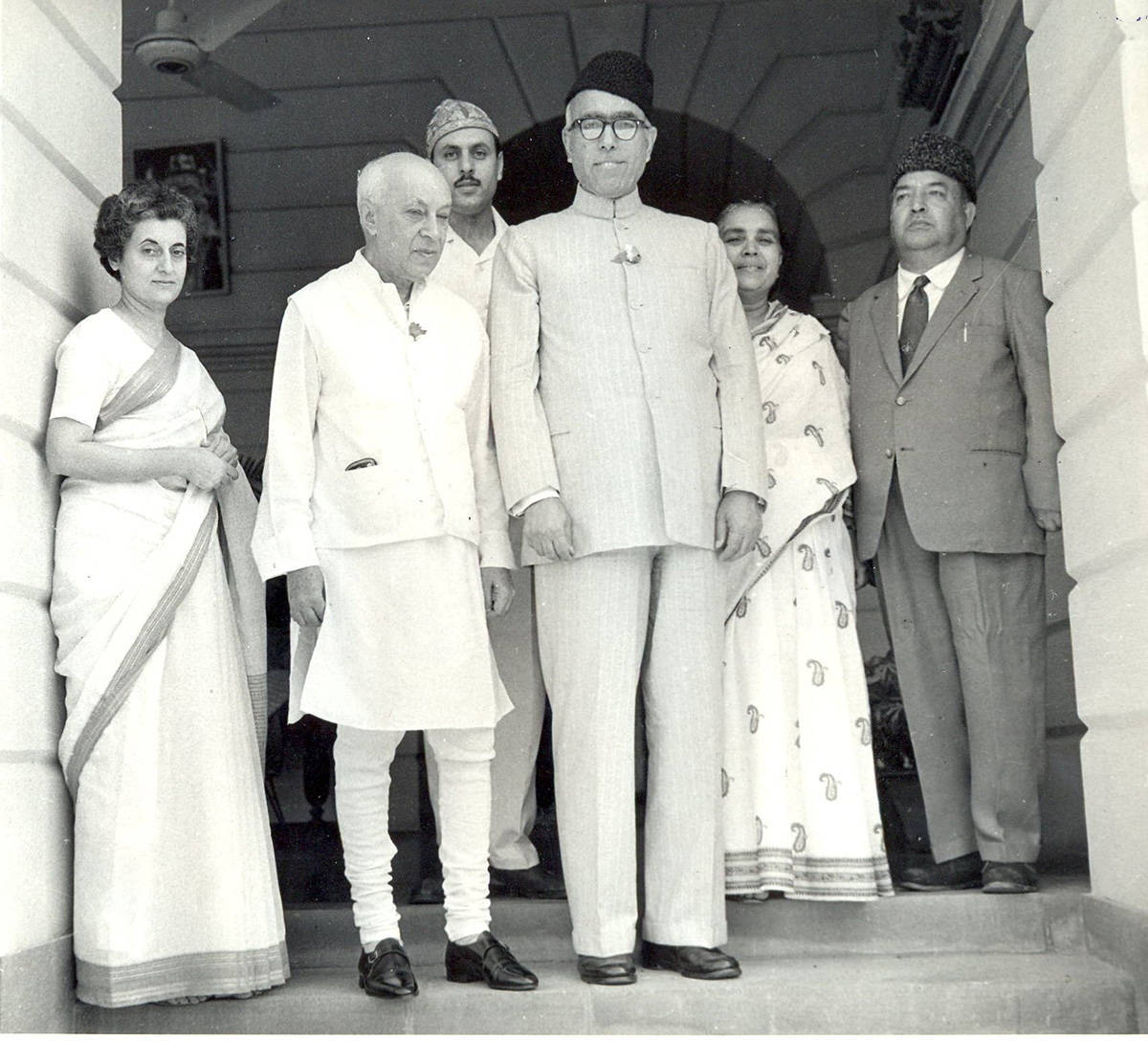 Sheikh M Abdullah with Nehru and Mrs Gandhi |
Differences in Foreign Policy
Nehru and Patel’s foreign policies too were fundamentally opposed. Patel rightly questioned the legitimacy of India’s policy in delaying recognition to the state of Israel only to placate the sentiments of its Muslim citizens. He was also perturbed by the approach of Nehru towards the Chinese and was deeply anguished in India being unable to defend the right of the Tibetan people who had reposed ‘faith in us, who chose to be guided by us’ but who became victims to Chinese ‘perfidy’. Patel presciently warned Nehru that ‘while we regard the Chinese as friends, they do not regard us as their friends’.
In reply to Patel’s letter which should have set alarm bells ringing, Nehru with his magnanimous internationalist outlook remarked that the Chinese occupation of Tibet was a foregone conclusion and that it was unlikely that any power on earth could halt the march of the Red Army. Nevertheless, the Tibetan people had no reason for trepidation since Tibet’s ‘unique geography, terrain and climate’ would ensure that a ‘large measure of autonomy is indeed inevitable’.
As for an Indo-China military conflict, Nehru confidently predicted that such a situation was ‘unlikely’ in the ‘foreseeable future’. Nehru ‘rule(d) out any major attack on India by China’. Moreover, he rejected Patel’s advice of modernizing the army and making adequate security provisions since it would ‘cast an intolerable burden on us, economic or otherwise and it would weaken our general defence position’. Nehru’s brief tryst with disarmament was a disaster. The fate of Tibet and India’s China war can be attributed to Nehru’s lack of foresight, his reluctance to heed to the warnings of his peers, and ultimately his grave pretensions.
With regards to Pakistan, Nehru and Patel’s disagreements were further accentuated. Gandhi himself was a key player against Patel in this drama. He went on an indefinite fast in protest against Patel withholding the payment of Rs 55 crore to Pakistan. Patel had judiciously deferred payment until the issue of Kashmir and its Hindu minorities was resolved to the satisfaction of all stakeholders. India was under no obligation to pay the entire sum all at once. However, Gandhi’s fastidiousness and his failing health compelled Patel to yield to his demands.
The disagreements with Nehru on the Kashmir issue have not found sufficient attention since Patel had deferred to Nehru’s wishes in not interfering in Kashmir. Nehru’s ‘genius’ in handling the Kashmir issue allowed the state to maintain an Islamic identity. Nehruvian apologists were quick to tarnish the name of the liberal but Hindu Maharaja Hari Singh, the ruler of Kashmir valley for his alleged procrastination in signing the instrument of accession to India. However, nothing could be further from the truth.
For it was Nehru’s precondition that the Maharaja could accede to India only by first transferring power to Sheikh Abdullah, a man, who by no stretch of imagination represented Hindu or Sikh populations, and even among Muslims of the entire valley it was doubtful if his popularity exceeded that of the Maharaja, even in the highly vitiated and communalized atmosphere to which Abdullah’s demagoguery had contributed in no small measure. However, for Nehru, as Harmans Singh states, ‘Sheikh Abdullah was the key to first exposing the fallacy of the two nation theory and then establishing the secular credentials of new India’.
Nehru was also guilty of taking the Kashmir issue into the UN and internationalizing it only for the sake of enhancing his personal esteem in Western eyes. Moreover, the promise of a plebiscite was also entirely unwarranted. Again, it was left to Patel to save the day. General Sam Manekshaw who was a colonel during the first Indo-Pak war of 1948 was privy to how Nehru was seized with indecision until an infuriated Patel himself passed the order to carry Indian troops through air which prevented the fall of Srinagar and redeemed the situation. Later, Patel confessed to Baxi Ghulam Mohammad that he was unable to resolve the Kashmir problem since he did not enjoy Nehru’s confidence.
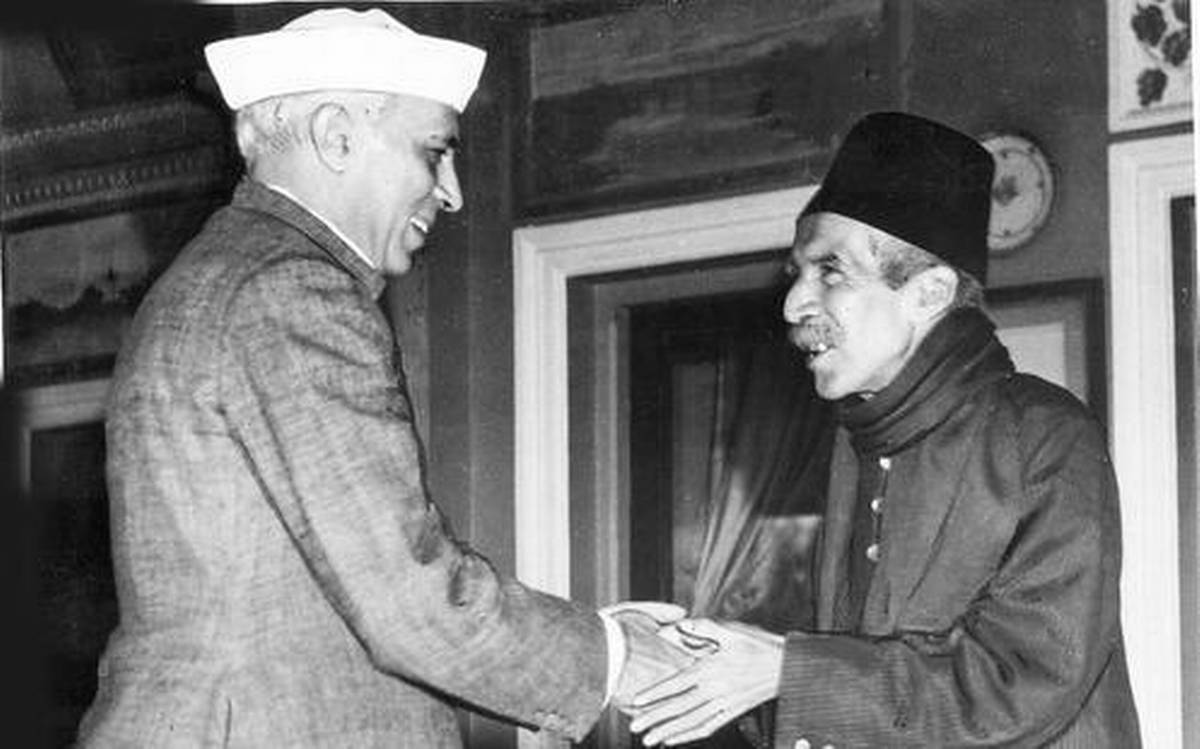 Nehru and Nizam of Hyderabad |
The integration of the state of Hyderabad was also problematic for Nehru because the ruler of the province, the Nizam, was a Muslim. The Nizam’s predominantly Hindu subjects suffered at the hands of Razakars, the local militia, who wanted Hyderabad to remain an Islamic state outside the Union of India. But Patel’s intervention through police action broke the Razakars’ back. Contemporaries such as NG Ranga however suggest that the deployment of force was delayed due to Nehru’s insistence.
Differences on Communalism
Perhaps, the most irreconcilable differences between Nehru and Patel related to their approach towards countering communalism and the violence that came in its wake. In the elections to the Central Legislative Assembly, and later the provinces, the Congress and the Muslim League emerged as the two major parties. The Muslim league secured 86.6% of the vote of the Muslim electorate with many pro-India nationalist Muslim candidates losing their deposits. It is true that the electorate did not comprise of universal adult franchise but it is doubtful if its application would have drastically altered the results for either the Congress or the League.
However, post partition it was found India would be home to more Muslims than even Pakistan while large Hindu minorities were left behind in East and West Pakistan. The difference was solely that while the Hindus opposed partition by voting the Congress, most of the Muslim electorate by voting for the Muslim League had supported partition although they later discovered the wisdom to remain in India.
Nehru’s policy of combating communalism rested on positioning himself as the paramount defender of Muslim interests while Hindu communal organizations like the RSS and the Hindu Mahasabha had to be eliminated from public life. It did not matter that organizations like RSS were responsible for the safety of thousands of Hindus and Sikhs in certain riot torn areas of Pakistan.
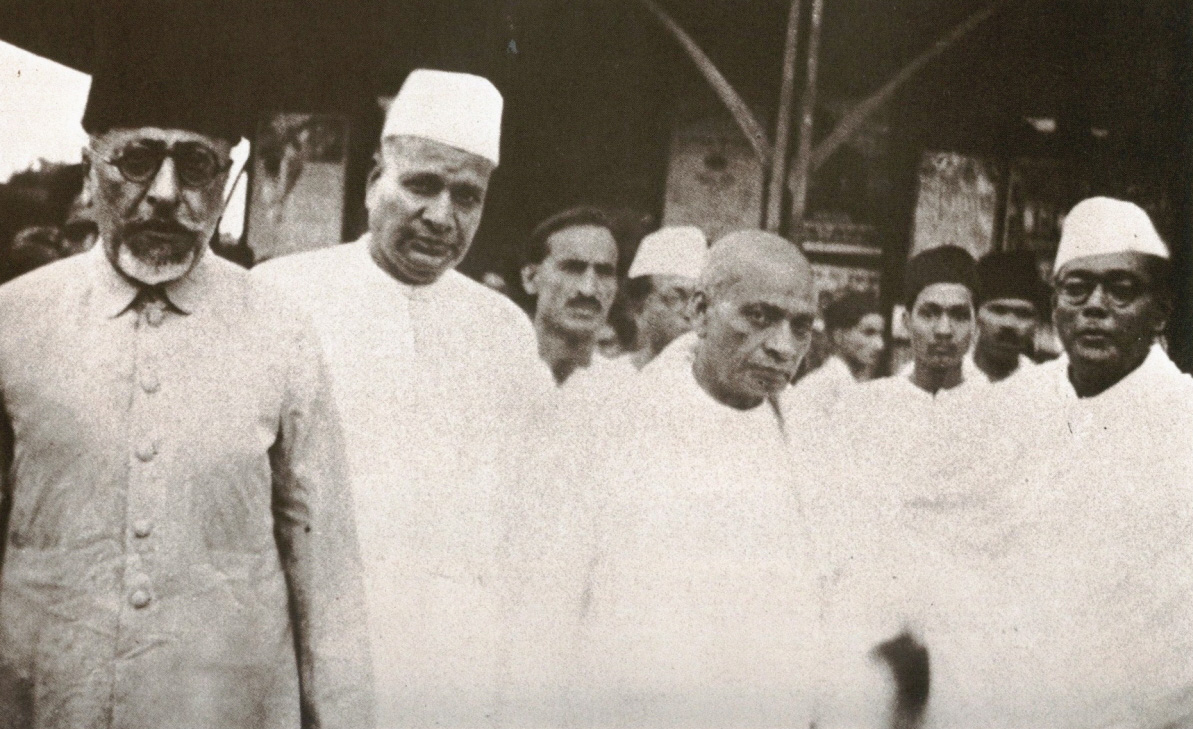 Sardar Patel and Maulana Abul Kalam Azad |
Patel, on the other hand, had a far more nuanced, just and pragmatic view of the situation. He was frank in admitting that the root cause of communal violence in India was the continued pogroms directed against Hindus in Pakistan, East and West. Patel was absolutely committed to securing the lives and property of Indian Muslims. For instance, at the Panthic Conference on 22th October 1947 at Patiala, Patel urged the Sikh community to refrain from shedding of innocent blood and eschewing all ideas of retaliation.
He was unequivocally transparent in subscribing to the adage of full protection for minorities. Nevertheless, he could not, unlike Nehru, remain oblivious to the plight of Hindus in Pakistan. The Indian government was morally obliged to protect Hindus throughout the domain of undivided India but this fact ostensibly did not register with Nehru for whom secularism simply meant a legislative principle of protecting only the minority who subsisted within the newly crafted Indian borders. After 1950 when the Citizenship Act was enacted, Nehru also perhaps believed that his obligation remained only towards Indian citizens irrespective of the paradox that many of those who had reposed faith in the Congress were being deprived of Indian citizenship while many of those who opposed the Congress were rewarded with Indian citizenship.
In stark contrast, Manibehn had observed her father of ‘worrying day and night’ over the perils which awaited the Hindus in East Bengal, possibly not unlike those in the Pakistani provinces of ‘Sindh, Punjab, Baluchistan and Frontier’ where Hindus were on the verge of being history. Patel was deeply anguished at the fate which had befallen those unfortunate Hindu women in Pakistan who were kidnapped, raped and forcibly converted by Islamic fundamentalists.
Nehru, in another dubious gesture of friendship towards Pakistan, scripted the Nehru-Liaquat Pact with Pakistan in 1950 which avowed that each country would ensure the safety of its religious minorities without interfering with each other’s domestic domains, in essence a “no war” pact. The pious sentiments expressed in the pact were not worth the paper they were scripted upon, for the Pakistani government had been instrumental in allowing the continuing persecution of Hindus who, forget special rights and privileges, did not enjoy even equal citizenship rights at par with Muslims. The fact remains that if Nehru was genuinely concerned and sincere in making of the pact, he should have ensured Hindu minorities of Pakistan were conferred the same rights and privileges which Indian Muslims enjoyed but he was nonchalant to such concerns. Shyama Prasad Mukherjee disgusted with Nehru’s duplicity resigned in protest from his cabinet.
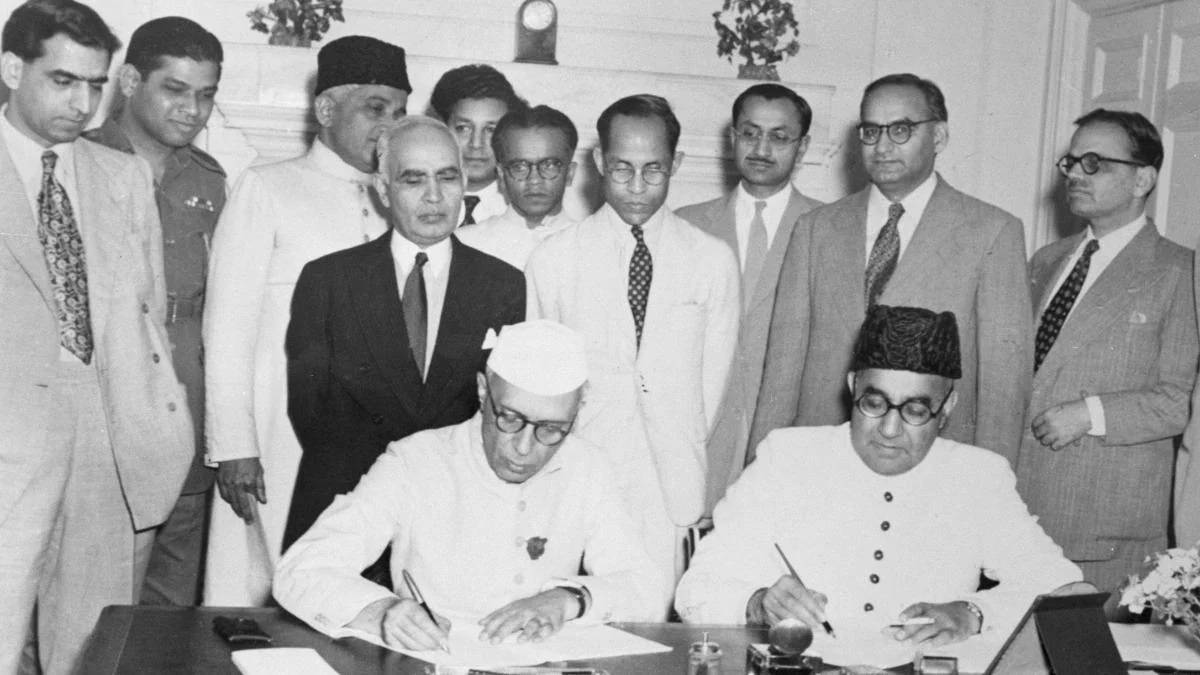 Nehru-Liaquat Pact |
Patel also completely disapproved of Nehru in principle but his failing health forced him to cave in to his pressure and even compelled to peddle the pact among the Bengalis. However, he maintained that if the persecution of Hindus continued in East Bengal, then Pakistan would be forced to cede a share of territory sufficient enough to accommodate and rehabilitate the Hindu refugees. Nehru vetoed the move on the ground that the migration of Hindus taking place was merely due to “deteriorating economic conditions”.
Historian Ramachandra Guha similarly wants us to believe that the flight of Hindus from Pakistan was merely a result of dissatisfaction from subsisting in Muslim majority territory. Although, at another time, Nehru admitted that Hindus were ‘terrified’ of living in Pakistan but immediately qualified with a specious generalization that there was ‘hardly a Muslim in Bengal or even Delhi who has a sense of safety’.
Nehru’s act of abandoning Pakistani Hindus to the mercy of their Islamic tormentors is probably the only instance in the contemporary world where the head of state of a larger and more powerful nation submitted its prestige and dignity of its people only to gratify his personal and peculiar political agenda.
Patel believed in the principle of determined action for protection of minorities even at the risk of precipitating military conflict with Pakistan. Nehru believed that averting war was more important, even if it meant making unilateral concessions to Pakistan. This flawed generosity or rather appeasement was subject to exploitation by Pakistan. In fact, Nehru did not really avert wars, he merely deferred them.
With regards to the Muslim minority, Nehru was averse to the idea of suspecting the presence of any fifth columnists among them. However, the reality of partition through the ballot could not be ignored by Patel. In his infamous Lucknow speech, Patel cautioned separatists among the Muslims that mere declaration of loyalty would not do, but ‘practicable proof of their declarations’ was the need of the hour. This speech was reported by the Muslims to Gandhi who severely reprimanded Patel for doubting the loyalty of Indian Muslims.
Nehru was very keen to conscribe the ‘communal’ activities of the RSS and the Mahasabha. The assassination of Mahatma Gandhi gave him the perfect opportunity. It was a difficult time for Patel too as he almost resigned when he discovered insinuations being leveled against him charging him with deliberating being lax on Gandhi’s security, although the searching and frisking of visitors to his prayer meetings was disallowed by Gandhi himself. Nehru did concede that of “A large number of RSS men have been arrested, probably many of them more or less innocent” but this naked violation of civil liberties did not upset his ‘liberal’ sensitivities.
Nehru further believed in teaching the RSS a lesson since there was ‘a widespread impression in England ‘that they (RSS) are fascist, communal minded people and any action we take in regard to them will be considered from this point of view’.
Patel on the other hand, at a time of great personal upheaval and sense of loss, did not lose track of the need for upholding justice and avoiding vendetta. Although, initially, he too believed that the RSS and the Mahasabha were responsible for creating the conditions which led to Gandhi’s murder, he allowed an independent investigation without prejudicing it with his or Nehru’s beliefs.
Later, RSS received a clean chit as it was not involved in the assassination of Gandhi. Similarly, with regards to the Hindu Mahasabha, Patel agreed that the organization was not involved in the conspiracy. True to his self, he did not sacrifice any innocent men at the altar of political opportunism for the sole purpose of boosting his secular credentials.
Patel’s lasting contribution was protecting the Indian constitution from the ogre of communal electorates. The Minto-Morley reform introduced communal electorates in 1909 and provided the seeds of political legitimacy for a separate Islamic homeland. The attempt by certain Muslim members of the constituent assembly to surreptitiously introduce communal electorates ostensibly as a token of affection on the part of the Hindus for the Muslim minorities was nipped in the bud by Patel who curtly told Nehru of his ‘refus(al) to accept, any communal reservations which are in the nature of a concession to a militant minority’. However, Rafiq Zakaria had contended that Patel was instrumental in attaching the word “propagation” in Article 25, and enactment of article 29 and 30 which granted exclusive cultural and educational rights for minorities. We do not find any evidence for the same.
The Nehruvian Paradox: The Twilight of the Secular State
The Marxist historian Romila Thapar reminds us that the reconstruction of the Somnatha Temple was carried out as a private venture through an independent trust and did not involve ‘sponsorship of the government’ which upheld its secular character. What she fails to inform is that the activity also involved a relocation of a mosque built there to a place nearby. Nehru had actually denied K M Munshi’s request on the grounds that a secular government could not engage in religious activity. Patel suggested the creation of a private trust with Munshi as a member to initiate the activity. Nehru never fully reconciled with this act of insubordination and also advised the president Rajendra Prasad against attending the temple’s inauguration claiming such an act was against India’s secular ideals.
Nevertheless, Nehru was instrumental in passage of the Haj Committee Act in 1959. The adage of Islamic exceptionalism meant that the ideals of the secular state were immaterial and inapplicable in this case. The sanctimonious nature of Nehru’s secularism did not find the annual utilization of crores of public money for a religious pilgrimage benefiting at best merely a tenth of its population antithetical to India’s secular ideals.
To Nehru the view of the Hindu orthodoxy was irrelevant and debarred from influencing policy making, while Muslim exceptionalism was granted an honourable place in issues of governance.
Patel’s name had long fallen into disuse by carefully crafted and wilful neglect until attempts by Narendra Modi to resurrect his memory and pay homage to his grand contributions in unifying India’s 500 odd princely states through creation of a ‘statue of unity’, His action was panned by ‘secularist’ commentators as attempts to appropriate Patel and his legacy. The ‘secular’ rhetoric could not admit that it was impossible for the Congress to derive political capital out of a man whose life was the fulfilment of a Nehruvian counter-position in all spheres of public life and policy. Therefore, in life Patel was painted as ‘an enemy of the Muslims’.
Several leftist commentators persisted in a defamation campaign against Patel even in his death. For instance, New Age, a left wing daily published during Indira Gandhi’s early reign indulged in the calumny of dubbing Patel as “a die-hard reactionary, given to even communalism and chauvinism” and that he was “a drag on Nehru”.
The differences between Nehru and Patel represent two competing worldviews. Nehru’s shaped India’s destiny for a bulk of its independent history. If Patel’s worldview gains currency, and eventually triumphs, India could well be on its way to fulfil its true potential.
References
Swarajyamag.com - Revisiting Nehru-Patel Differences by Saurav Basu - Oct 12, 2014
See Patel’s Bombay civic address , In tune with the millions, Ed. G M Nandukar, 1975, p. 258
Neerja Singh, Nehru-Patel Agreement within Differences, p. xii
Inder Malhotra, A first principles disagreement, Indian Express, 3.4.2009
V Shankar Sardar Patel Select Correspondence Vol. 2 p. 635
Inside story: the diary of Manibehn Patel
Patel to Nehru, Oct 13’ 1950
Ibid
V N Datta, Patel’s legacy http://www.tribuneindia.com/2001/20010930/spectrum/main1.htm
Koenraad Elst, Gandhi and Godse, Voice of India, 2001, p. 144
S Gopal, Jawaharlal Nehru: Vol 1, 1975 (cited in India after Gandhi, Ramachandra Guha, p. 130)
Walter Crocker, Nehru: A contemporary estimate
Lucknow Session 1936 cited by K L Panjabi, The Indomitable Sardar, p. 105
Arvind Kumar Arvind Narendranathan Why Jawaharlal Nehru is the root cause of India’s economic troubles DNA 11. 7.2011 http://www.dnaindia.com/analysis/column-why-jawaharlal-nehru-is-the-root-cause-of-indias-economic-troubles-1564479
K L Panjabi, op. cit, p. 107
PM Nehru’s note on China and Tibet, 18th Nov., 1950. Cited in Balraj Krishna, Sardar Vallabhbhai Patel, p. 230-34
Maharaja Hari Singh: The Troubled years,p. xii, p. 242
Prem Shankar Jha, Kashmir 1947: Rival versions of history, OUP, 1996
This was Sardar: Commemorative volume, p. 421
History and Culture of the Indian People: The struggle for freedom, Bharatiya Vidya Bhavan, p. 724
L K Advani, My Country My Life
Patel to Nehru 28.th Mar’ 1950 V Shankar Sardar Patel Correspondence Vol. 2, p. 170
Tathagatha Roy My People uprooted: A saga of the Hindus of Eastern Bengal http://bengalvoice.blogspot.in/2008/05/chapter-6-push-comes-to-shove-killings.html
Ramachandra Guha India after Gandhi
Rafiq Zakaria, Sardar Patel and Indian Muslims, p. 101-02
Romila Thapar, The Past as Present: forging contemporary identities through history, p. 256
Hajj Committee Act, 1959 http://indiankanoon.org/doc/102428
Towards a gender sensitive civil code, Ramachandra Guha, Hindustan Times
 Support Us
Support Us
Satyagraha was born from the heart of our land, with an undying aim to unveil the true essence of Bharat. It seeks to illuminate the hidden tales of our valiant freedom fighters and the rich chronicles that haven't yet sung their complete melody in the mainstream.
While platforms like NDTV and 'The Wire' effortlessly garner funds under the banner of safeguarding democracy, we at Satyagraha walk a different path. Our strength and resonance come from you. In this journey to weave a stronger Bharat, every little contribution amplifies our voice. Let's come together, contribute as you can, and champion the true spirit of our nation.
 |  |  |
| ICICI Bank of Satyaagrah | Razorpay Bank of Satyaagrah | PayPal Bank of Satyaagrah - For International Payments |
If all above doesn't work, then try the LINK below:
Please share the article on other platforms
DISCLAIMER: The author is solely responsible for the views expressed in this article. The author carries the responsibility for citing and/or licensing of images utilized within the text. The website also frequently uses non-commercial images for representational purposes only in line with the article. We are not responsible for the authenticity of such images. If some images have a copyright issue, we request the person/entity to contact us at This email address is being protected from spambots. You need JavaScript enabled to view it. and we will take the necessary actions to resolve the issue.





















